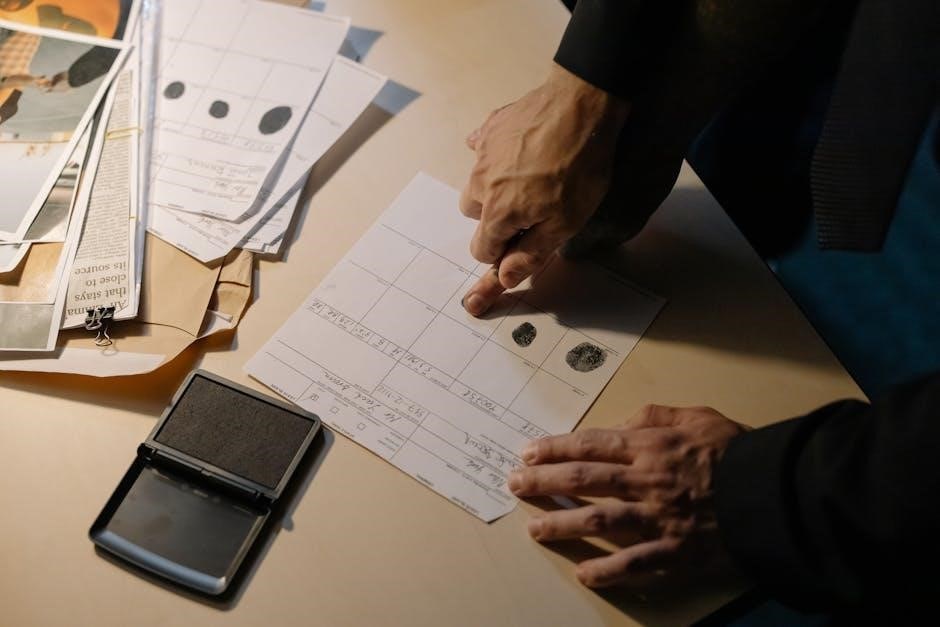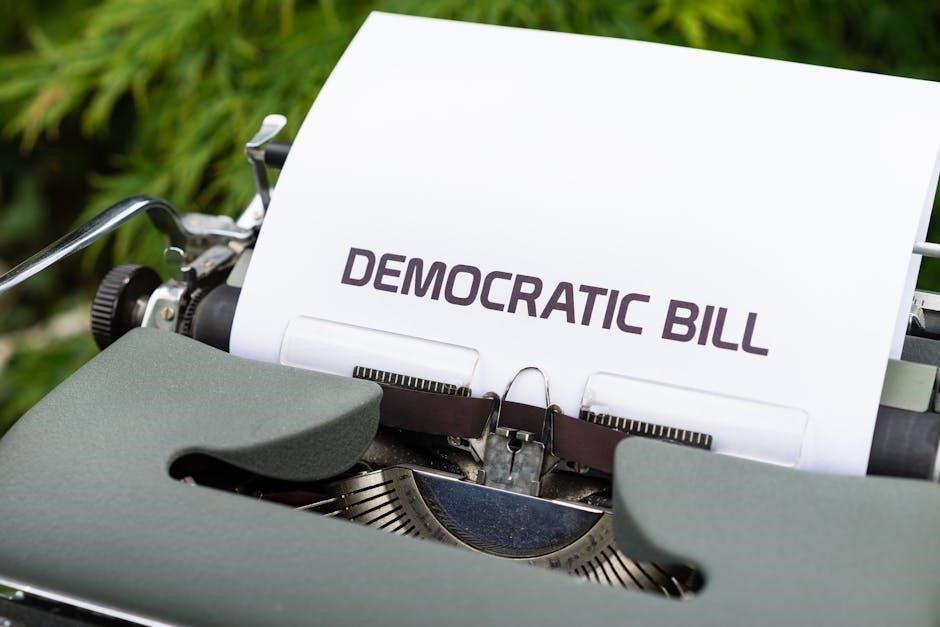The Ohio Sunshine Law Manual provides a comprehensive guide to understanding and complying with open government laws‚ promoting transparency and accountability in public affairs.
Purpose and Scope of the Manual
The Ohio Sunshine Law Manual serves as a detailed guide to understanding and implementing open government laws. Its purpose is to ensure transparency and accountability in public affairs by outlining requirements for open meetings and public records. The manual covers key provisions‚ exemptions‚ and compliance strategies‚ providing practical insights for public officials and citizens. It also addresses recent updates‚ such as the 2024 revisions‚ to reflect current legal standards. By offering clear explanations and resources‚ the manual aims to foster a culture of openness and trust in government operations across Ohio.
Historical Background of Ohio Sunshine Laws
Ohio Sunshine Laws originated from the federal Freedom of Information Act (FOIA)‚ influencing state-level transparency initiatives. The laws were enacted to ensure public access to government meetings and records‚ fostering accountability. Over the years‚ the manual has undergone revisions‚ with the 2024 updates refining provisions for digital accessibility and clarity. These laws reflect Ohio’s commitment to open government‚ empowering citizens to engage in public affairs and trust governmental operations.
Key Principles of Open Government in Ohio
The Ohio Sunshine Law Manual emphasizes transparency‚ accountability‚ and public participation as core principles of open government; These principles ensure that governmental actions are open to public scrutiny‚ fostering trust and integrity. Transparency involves making public records and meetings accessible‚ while accountability requires officials to be answerable for their actions. Public participation encourages citizen engagement in decision-making processes‚ ensuring that governance reflects community needs. These principles are central to the manual’s guidance‚ promoting ethical and responsive governance in Ohio.

Key Provisions of the Ohio Sunshine Law
The law mandates open public meetings‚ adequate notice requirements‚ and access to public records‚ with penalties for non-compliance and specific exemptions.
Definition of Public Meetings
A public meeting under Ohio Sunshine Law is a gathering of a public body where discussions‚ decisions‚ or deliberations occur regarding public business; It requires the presence of a quorum‚ typically three or more members of a public body‚ and involves matters affecting the public. Public business includes actions‚ decisions‚ or deliberations that bind or inform public policy. Meetings must be conducted in accordance with the law‚ ensuring transparency and accountability. This definition excludes informal gatherings or social events unrelated to official duties.
Requirements for Public Notice
Public bodies in Ohio must provide adequate notice of meetings to ensure transparency. Notices must be posted in a prominent location accessible to the public‚ such as a municipal building or website‚ and may also be published in a local newspaper. The notice must include the meeting’s time‚ place‚ and purpose‚ and must be made at least 24 hours in advance. For special or emergency meetings‚ notice requirements are adjusted but still ensure reasonable public awareness. Proper notice ensures accountability and public participation.
Public Records and Accessibility
Under Ohio law‚ public records must be made available for inspection or copying promptly upon request. Records include documents‚ emails‚ and other materials created or received by public offices. Agencies may charge a nominal fee for copies‚ but fees must be reasonable and as established by law. Public offices must adopt a records policy and designate a custodian to handle requests. While most records are accessible‚ exemptions apply to sensitive information like medical records‚ trade secrets‚ or confidential legal matters. Transparency is prioritized unless exemptions apply.
Prohibited Activities Under the Law
The Ohio Sunshine Law prohibits public bodies from conducting secret meetings‚ denying access to public records without justification‚ or engaging in actions that prevent transparency. It forbids deliberations via private messaging or informal gatherings. Public officials cannot withhold records to evade scrutiny. Charging excessive fees for document access or delaying responses is also prohibited. Violations may result in fines or legal action‚ ensuring accountability and adherence to open government principles. These prohibitions safeguard citizens’ rights to information and participation in public affairs. Compliance is essential to maintain trust and ensure ethical governance practices.

Understanding Open Meetings
Open meetings in Ohio ensure transparency by requiring public bodies to conduct discussions and decision-making processes openly. This fosters accountability and public trust in governmental actions.
What Constitutes a Public Body
A public body under Ohio Sunshine Law includes any state or local agency‚ board‚ commission‚ or entity supported by public funds. This encompasses government agencies‚ school boards‚ city councils‚ and public universities. The definition also extends to private entities performing public functions or receiving public funds. The law ensures transparency by requiring these bodies to hold open meetings. This broad definition aims to cover all entities that make decisions affecting the public‚ ensuring accountability and access to information for Ohio residents.
Rules for Conducting Public Meetings
Public meetings must be conducted openly‚ with advance notice provided to the public. Agendas should be shared at least 24 hours before the meeting‚ detailing topics for discussion. A quorum is required‚ and meetings must be accessible to all individuals. Minutes must be recorded and made available upon request. Prohibited activities include secret ballots and discussions of non-emergency matters in executive sessions. These rules ensure transparency‚ accountability‚ and public participation in governmental decision-making processes.
Minutes and Record-Keeping Requirements
Public bodies must maintain accurate and complete minutes of all meetings‚ reflecting the date‚ time‚ place‚ attendees‚ and actions taken. Minutes must be available for public inspection promptly after the meeting. They should include a record of votes‚ motions‚ and any decisions made. Audio or video recordings may also be kept‚ but written minutes remain the primary record. These records must be retained for a specified period and made accessible to ensure transparency and accountability in governmental proceedings.

Public Records and Their Accessibility
Public records in Ohio are broadly defined and must be made available for inspection and copying upon request‚ ensuring transparency and accountability.
Definition of Public Records
Under Ohio law‚ public records are defined as any document‚ device‚ or item created or received by a public office that documents the organization‚ functions‚ policies‚ decisions‚ procedures‚ operations‚ or other activities of the office. This includes‚ but is not limited to‚ papers‚ accounts‚ computer files‚ emails‚ and other electronic records. The definition is broadly interpreted to ensure maximum accessibility‚ covering nearly all records related to public business‚ with limited exceptions for sensitive or confidential information. Public records must be accessible to anyone upon request.
Procedures for Requesting Records
Under Ohio law‚ requesting public records is a straightforward process. Individuals may request records verbally‚ in writing‚ or via email‚ though written requests are recommended to ensure clarity. Public offices are required to respond promptly‚ typically within a reasonable time frame. Requesters do not need to explain why they seek the records. Offices must respond by indicating whether the records exist‚ are available‚ or if access is denied. If fees apply‚ the requester must be notified in advance. Denials must be in writing and explain the basis for withholding the records.
Exemptions from Public Disclosure
Ohio Sunshine Law includes specific exemptions to protect sensitive information. Records containing personal privacy details‚ such as Social Security numbers or medical information‚ are exempt. Law enforcement records related to ongoing investigations or confidential sources may also be withheld. Trade secrets‚ confidential business information‚ and certain attorney-client communications are protected. Additionally‚ records pertaining to security plans‚ emergency response strategies‚ or public safety may be exempt. These exemptions balance transparency with the need to safeguard individual rights and public interests.

Exceptions and Exemptions
The Ohio Sunshine Law includes specific exceptions to protect sensitive information‚ ensuring a balance between transparency and the safeguarding of private or security-related interests.
Confidentiality and Privileged Information
Under the Ohio Sunshine Law‚ certain communications and records are exempt from disclosure to protect confidentiality and privileged information. This includes attorney-client privileged communications‚ medical records‚ and trade secrets. The law recognizes that some information‚ while not publicly accessible‚ is essential to maintain privacy and legal rights. Public officials must carefully balance transparency with the obligation to safeguard sensitive data‚ ensuring compliance with legal protections while upholding public trust.
Negotiations and Collective Bargaining
The Ohio Sunshine Law allows certain exceptions for negotiations and collective bargaining sessions. Public bodies may hold private discussions regarding strategy or plans when meeting with their attorneys or representatives. However‚ final actions‚ such as voting on agreements‚ must occur in open meetings. This balance ensures transparency while protecting the integrity of negotiation processes. Public officials must ensure that all decisions are ultimately made in public‚ maintaining accountability and compliance with the law.
Security and Emergency Response Plans
The Ohio Sunshine Law exempts discussions and records related to security and emergency response plans from public disclosure. This exemption ensures that sensitive information‚ which could compromise public safety if revealed‚ remains confidential. Public bodies may withhold details about security measures‚ emergency procedures‚ and infrastructure vulnerabilities. However‚ this exemption is not absolute and must be applied narrowly to avoid unnecessary secrecy. The law requires that such exemptions be justified and comply with legal standards to prevent abuse.

Enforcement and Compliance
Oversight ensures public bodies adhere to Sunshine Law requirements‚ with the Ohio Attorney General conducting reviews and addressing citizen complaints to maintain transparency and accountability.
Role of the Ohio Attorney General
The Ohio Attorney General plays a crucial role in enforcing Sunshine Laws by reviewing complaints‚ conducting investigations‚ and ensuring compliance with open meeting and public records requirements. The office provides guidance to public officials through training programs and legal opinions‚ promoting transparency and accountability. It also has the authority to audit public bodies and address violations‚ helping to maintain public trust in government operations and decision-making processes across the state.
Penalties for Non-Compliance
Non-compliance with Ohio Sunshine Laws can result in legal consequences‚ including fines and potential prosecution. Public officials or bodies found violating open meeting or public records laws may face penalties of up to $500 per violation. Courts may also invalidate actions taken during non-compliant meetings. Additionally‚ individuals who knowingly violate the law may be subject to criminal charges. These penalties emphasize the importance of adherence to transparency requirements‚ ensuring accountability and public trust in governmental operations.
Court Proceedings and Appeals
Court proceedings and appeals under the Ohio Sunshine Law ensure accountability and resolution of disputes. Individuals or entities may file complaints alleging violations‚ leading to judicial review. Courts assess whether public bodies complied with open meeting or public records requirements. Rulings can result in injunctions‚ reversals of decisions‚ or mandates to disclose records. Appeals may be filed within 30 days of a lower court’s decision. The process reinforces transparency and provides a legal framework for addressing non-compliance‚ ensuring public access to governmental activities and information.

Training and Resources
Annual training is required for public officials to ensure compliance. The Ohio Attorney General provides online resources‚ guides‚ and workshops to facilitate understanding and adherence to the Sunshine Law.
Annual Training Requirements
Public officials in Ohio are required to complete annual training on the Sunshine Law. This ensures understanding of open meetings and public records laws. The Ohio Attorney General oversees these sessions‚ which cover key topics like definitions of public records‚ meeting requirements‚ and prohibited activities. The training emphasizes compliance‚ fostering transparency and accountability in government operations. Both elected officials and government employees must participate to stay informed and adhere to legal standards‚ promoting open governance effectively across the state.
Online Resources and Guides
The Ohio Attorney General provides comprehensive online resources and guides to help public officials understand and comply with the Sunshine Law. These resources include detailed summaries of the law‚ practical checklists‚ and training materials. Officials can access these tools on the Attorney General’s official website. The guides cover topics such as public records requests‚ meeting requirements‚ and exemptions. They also offer insights into handling requests and maintaining transparency. These resources ensure officials are well-informed and equipped to adhere to open government principles effectively.
Workshops and Seminars
The Ohio Attorney General’s office conducts regular workshops and seminars to educate public officials on Sunshine Law compliance. These sessions cover key topics like open meetings‚ public records‚ and exemptions. Interactive formats allow attendees to ask questions and engage in real-world scenarios. The training emphasizes practical application‚ ensuring officials understand their responsibilities. Workshops are held statewide‚ making them accessible to all public entities. They provide updates on legal changes and best practices‚ fostering a culture of transparency and accountability in Ohio’s government operations.

Recent Updates and Reforms
The Ohio Sunshine Law has seen recent reforms‚ including the 2024 revisions‚ which enhance transparency and accountability in public meetings and records access.
2024 Revisions to the Sunshine Law
The 2024 revisions to the Ohio Sunshine Law aim to enhance transparency and accountability. Key updates include clarifying definitions of public records and meetings‚ stricter penalties for non-compliance‚ and updated notice requirements. The reforms also expand training obligations for public officials and align the law with modern technologies. These changes reflect Ohio’s commitment to open government‚ ensuring citizens have greater access to information and decision-making processes. The revisions address emerging challenges while maintaining the law’s core principles of transparency and public trust.
Impact of New Technologies
New technologies have significantly influenced the implementation of Ohio’s Sunshine Law. Virtual meeting platforms now enable remote participation in public sessions‚ enhancing accessibility. Digital record-keeping systems improve the storage and retrieval of public documents. However‚ these advancements also raise concerns about cybersecurity and data privacy. Public bodies must adapt to ensure compliance while leveraging technology to maintain transparency. The integration of modern tools has streamlined processes but requires careful management to uphold the law’s intent and protect sensitive information from potential breaches or misuse.
Emerging Trends in Open Government
Emerging trends in open government emphasize enhanced digital engagement and transparency. Ohio is adopting tools like interactive dashboards and real-time data sharing to foster public participation. Collaborative efforts between state agencies and local governments are improving accountability. Citizen-centric platforms are being developed to streamline access to information. These trends reflect a growing commitment to inclusivity and responsiveness‚ ensuring that Ohio remains a leader in open government practices. By embracing innovation‚ the state aims to build trust and empower citizens through greater accessibility and transparency in governance.

Case Studies and Court Decisions
Case studies and court decisions highlight the importance of transparency and compliance with Ohio’s Sunshine Law‚ providing practical insights into its application and interpretation.
Landmark Cases in Ohio Sunshine Law
Landmark cases in Ohio Sunshine Law have shaped the interpretation and enforcement of open government principles. A key case involved the Toledo City Council‚ where the court ruled that private discussions among members via email violated the law. Another significant case clarified that public bodies must provide adequate notice for meetings‚ even if no formal action is taken. These decisions underscore the importance of transparency and adherence to procedural requirements‚ ensuring public access to governmental decision-making processes.
Recent Court Rulings and Their Implications
Recent court rulings in Ohio have further clarified Sunshine Law applications‚ emphasizing transparency and accountability. A notable decision affirmed that virtual meetings during emergencies‚ like COVID-19‚ are permissible if adequate public access is ensured. Another ruling addressed redactions in public records‚ requiring agencies to justify withholdings thoroughly. These cases highlight the courts’ commitment to balancing government efficiency with public oversight‚ reinforcing the importance of strict compliance with Sunshine Law provisions to maintain trust and ensure open governance.

Practical Applications
Public officials must ensure meetings are open‚ provide timely notices‚ and maintain clear records. They must also handle public records requests promptly and transparently‚ ensuring compliance with training and updated procedures.
Best Practices for Public Officials
Public officials should consistently prioritize transparency and accountability. They must avoid private discussions on public matters‚ ensure all meetings comply with notice requirements‚ and provide full access to records. Officials should respond to requests promptly‚ maintain accurate records‚ and seek legal advice when unsure. Proactive disclosure of information and open communication with the public foster trust. Regular training on Sunshine Law updates ensures compliance. By adhering to these practices‚ officials uphold the law’s intent and promote open‚ ethical governance.
Handling Requests for Information
Public officials must respond to information requests promptly and fairly. Acknowledge requests within a reasonable timeframe‚ ideally the same business day. Clearly communicate any deadlines or extensions needed. Provide requested records in a readable format‚ with redactions only for exempt information. Offer assistance to refine requests if necessary. Maintain detailed records of all interactions. Ensure compliance with timelines and exemptions outlined in the law. Transparency and efficiency in handling requests build public trust and demonstrate commitment to open governance.
Transparency in Decision-Making Processes
Transparency in decision-making is a cornerstone of the Ohio Sunshine Law‚ ensuring that public bodies conduct their activities openly. Public meetings must be accessible‚ with agendas provided in advance. Citizens are encouraged to participate‚ and all discussions and votes should occur in open sessions unless exemptions apply. Clear records of meetings and decisions must be maintained and made accessible to the public‚ fostering accountability and trust in government operations. This openness ensures that public officials remain accountable to the citizens they serve‚ promoting a transparent government.
Related Laws and Regulations
The Ohio Sunshine Law aligns with federal and state laws promoting transparency‚ including the Freedom of Information Act and other open government regulations.
Public Records Law
The Ohio Public Records Law ensures access to government records‚ defining public records as any document‚ file‚ or item maintained by a public office. Agencies must respond promptly to requests‚ providing copies or allowing inspection. Exceptions exist for sensitive information‚ such as medical records or trade secrets. The law emphasizes transparency‚ requiring clear procedures for requests and appeals. Non-compliance can result in legal penalties. It complements the Sunshine Law by ensuring accountability and fostering trust in government operations through accessible information.
Open Meetings Law
The Ohio Open Meetings Law mandates that public bodies conduct meetings transparently‚ ensuring public access and participation. It applies to any gathering of a public body where official business is discussed or action is taken. Public notice must be given‚ and meetings must be open to all‚ with exceptions for specific sensitive matters. The law promotes accountability by requiring agendas and minutes to be accessible‚ fostering trust in governmental decision-making processes. Compliance ensures that citizens remain informed and engaged in public affairs.
Freedom of Information Act (FOIA)
The Freedom of Information Act (FOIA) is a federal law ensuring public access to government records. While primarily governing federal agencies‚ it complements Ohio’s Sunshine Laws by promoting transparency at the federal level. Under FOIA‚ individuals can request records‚ with exemptions for sensitive information like national security or personal privacy. Requests are processed within specific timelines‚ and denials can be appealed. FOIA aligns with Ohio’s Public Records Law‚ collectively fostering openness and accountability in government operations.
The Ohio Sunshine Law Manual emphasizes transparency and accountability in government‚ ensuring public access to information while balancing privacy. It fosters trust and open governance.
Importance of Adherence to Sunshine Laws
Adherence to Ohio Sunshine Laws is crucial for maintaining transparency and accountability in government. It ensures public trust by providing access to information and decision-making processes. Compliance fosters ethical governance‚ preventing corruption and misuse of power. Public officials must uphold these laws to guarantee open and fair proceedings. Failure to comply can lead to legal penalties and erosion of public confidence. By adhering to Sunshine Laws‚ Ohio promotes a culture of openness‚ strengthening its democratic framework and ensuring accountability to its citizens.
Future of Open Government in Ohio
The future of open government in Ohio lies in leveraging technology to enhance transparency and public engagement. Advances in digital platforms will enable easier access to public records and meetings. Artificial intelligence and data analytics could streamline information sharing‚ making it more efficient for citizens to engage with government processes; Additionally‚ fostering a culture of openness through education and training will empower both officials and the public to embrace these changes. By staying ahead of technological trends and fostering collaboration‚ Ohio can set a benchmark for open government nationwide.

